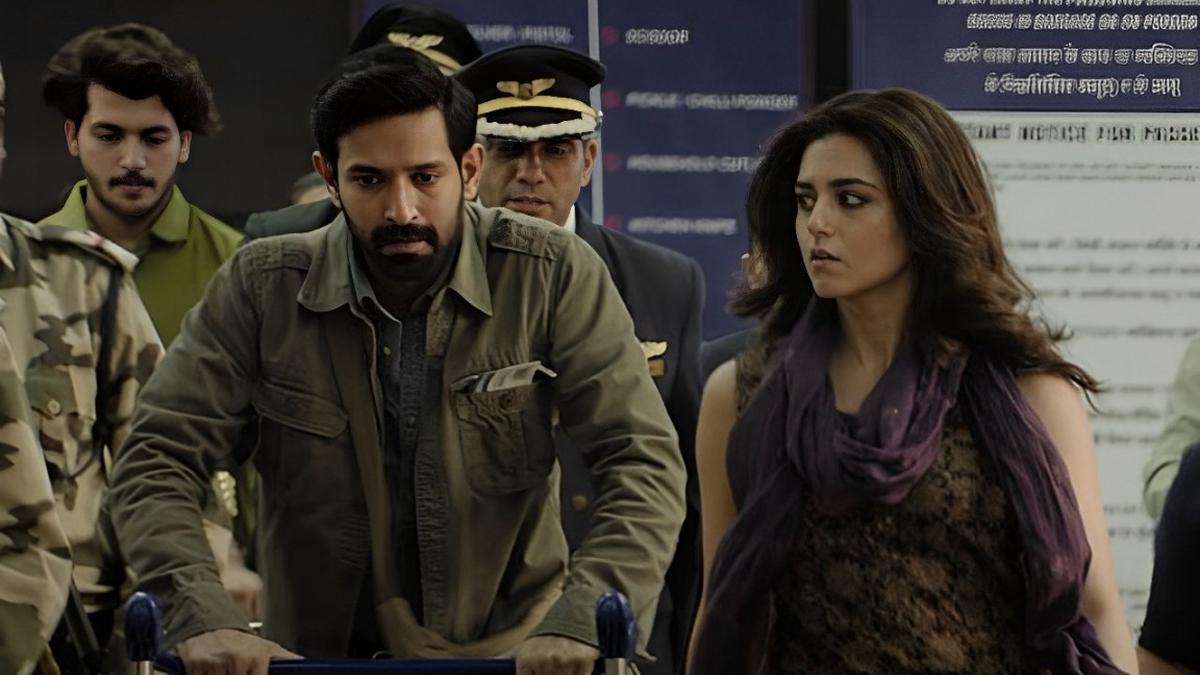‘The Sabarmati Report’ movie review: Vikrant Massey boards the propaganda train

In an interview that went viral ahead of The Sabarmati Report, actor Vikrant Massey, briefly turning political analyst, reflected on the state of the nation. “People say that Hindus are in danger, that Muslims are in danger. No one is in danger; everything is going fine. This is the best country to live in the world,” he declared in a podcast. The nervous naivety of Hindi film actors ahead of a controversial release is always enlightening to witness. It’s a balancing act no gymnast or slackliner can fathom.
Balance and fairness is a major concern in The Sabarmati Report. When a character, an elite, English-speaking news anchor played by Riddhi Dogra, argues that journalism is not just about reporting facts, but also “balance and context,” she is shushed by the film’s vernacular hero for conveying those words in English. Years later, the same hero, now a celebrated newsreader himself, albeit in Hindi, mentions a democratic and dharmnirpeksh (secular) Bharat. Even as he speaks, a bhajan plays on the soundtrack, and the final image is of the consecrated Ram temple in Ayodhya.
Based on the 2002 Godhra train burning tragedy, in which 59 people, mostly Hindu pilgrims and karsevaks returning from a ceremony in Ayodhya, died in a fire, The Sabarmati Report is a late-comer in a crowded genre of contemporary Hindi political films. Only recently, titles like The Kashmir Filesand The Kerala Story — convenient, incendiary narratives that cherry-pick facts to pander to strident sensibilities — seemed a surefire formula for success. Yet, with the 2024 General Election results well in the past, a sense of fatigue has set in. A prior film, Accident or Conspiracy: Godhra, based on the same subject, failed miserably. The Sabarmati Report was initially slated for May, but, following delays and reshoots, is releasing in the fag end of the movie year.
Samar (Vikrant Massey), a small-time reporter asking silly questions at movie launches, falls into depression and alcoholism after his findings about the Godhra incident don’t pass muster at the uppity and unscrupulous news channel where he works (Samar, indeed, would scoff at words like ‘uppity’ and ‘unscrupulous’). He is dragged out of his misery, five years later, by Amrita (Raashii Khanna), and the two get on with debunking the “accident” theory surrounding the burning of the Sabarmati train.
The Sabarmati Report (Hindi)
Director: Dheeraj Sarna (Replaced Ranjan Chandel)
Cast: Vikrant Massey, Raashii Khanna and Riddhi Dogra
Runtime: 127 minutes
Storyline: A vernacular journalist investigates the events of February 27, 2002, aboard the Sabarmati Express near the Godhra railway station in Gujarat
The death of karsevaks at the hands of Muslim mobs is widely cited as the trigger for the post-Godhra carnage in Gujarat, in which more than 1000 people were killed and countless others displaced. Glaringly — yet unsurprisingly — this aspect of the story is of little consequence in The Sabarmati Report. Though narrated from the perspective of two journalists, who rarely discuss the riots, the film is essentially a dramatization of the Nanavati-Mehta Commission report. The panel, set up by the then state government of Gujarat, submitted an interim report in 2008, declaring the train incident as an act of ‘planned conspiracy’. This ran counter to an earlier report filed by the Union Railway Ministry, which called it an ‘accident.’
Both the Godhra tragedy and the ensuing violence were reported in the English and vernacular press (the Nanavati report cites several of these). According to this film, however, that was not the case. It introduces a false dichotomy between English (elite, mendacious) and Hindi (honest, plainspoken, pro-Hindu) journalists. While targeting a fictitious news network that expanded during the Recession years—the audience is left to draw its own conclusions — it conveniently skips over the role of local publications in fanning the flames of communal hatred.
A sharp, incisive film about the lesser-known facets of Godhra would have been engaging. Here, every so often, emotions override inquiry. The screenplay telegraphs its pain for those massacred in the tragedy, which included several women and children. At the same time, the film works extra hard to protect and flatter the current establishment. The Gujarat CM circa 2002 is shown to be a female; Narendra Modi enters the picture a little late, while the state is basking in a growth boom. We also a get Sonia Gandhi lookalike, conspiring with her cohorts on how best to milk the situation.

There are a few grace notes. The Sabarmati Report was originally directed by Ranjan Chandel, who distanced himself from the project and was replaced by Dheeraj Sarna, a veteran TV writer. Unlike other propaganda films, the mood isn’t always conspiratorial and grim. There is a funny sequence constructed around the Hindi word ‘visthaapit’, a few drinking jokes, and the cinematography by Amalendu Choudary is textured and efficient. The film is also burdened, I believe, by a liberal conscience, however buried that may be. Muslims emerge as the clear and obvious villain — violent, duplicitous, reactionary — but there are a few good apples in the mix.
Vikrant Massey delivered a sincere, empathetic performance in 12th Fail(2023). The struggles of his character, an ordinary village boy breaching the gates of English education in India, felt genuine and life-like. This is not a feeling that emanates from The Sabarmati Report. The minor human moments that Massey can bring alive are sidestepped for high-pitched histrionics. He’s given too many dramatic speeches, but not much heft. It feels like a misstep, a desperate move from a desperate time. The hard -ining of Hindi cinema over the last ten years has claimed several great actors and performers. It will be sad to lose Mr. Massey too.
The Sabarmati Report is currently running in theatres.
Published – November 15, 2024 06:19 pm IST









